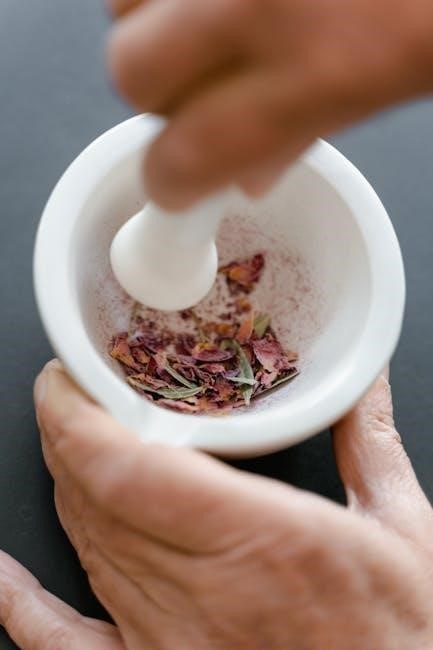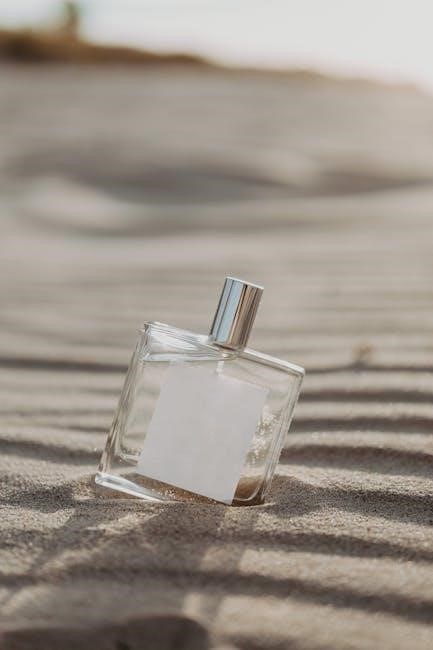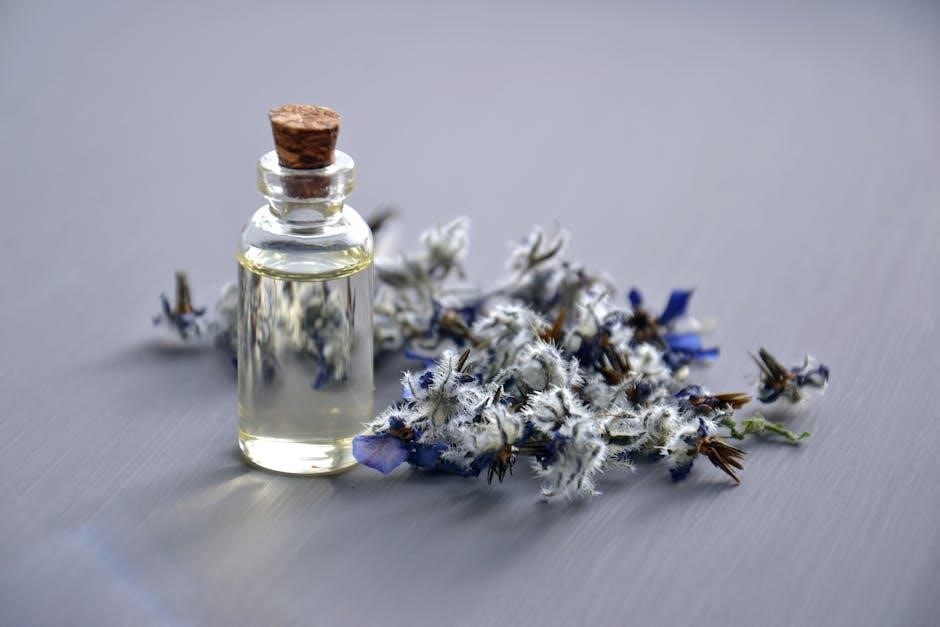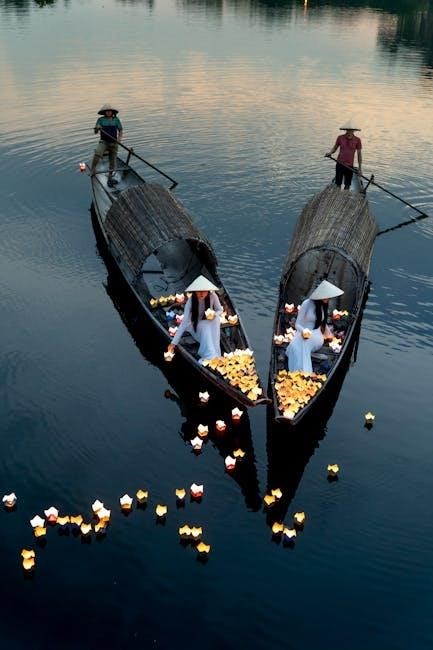Perfume is a blend of essential oils and alcohol‚ creating unique scents that enhance personal style and evoke emotions․ It plays a significant role in daily life and culture‚ offering a way to express individuality and connect with traditions worldwide․
1․1 What is Perfume?
Perfume is a fragrant liquid mixture of essential oils‚ aroma compounds‚ and solvents‚ typically diluted in alcohol․ It is designed to emit a pleasant scent‚ with concentrations varying from eau de cologne to parfum․ Perfume enhances personal style‚ evokes emotions‚ and serves as a cultural and social expression‚ transcending mere fragrance․
1․2 The History of Perfume
Perfume’s origins date back to ancient civilizations‚ with evidence of aromatic substances used in rituals and daily life around 3000 BCE․ Egyptians‚ Mesopotamians‚ Greeks‚ and Romans utilized fragrances for religious and personal purposes․ The art evolved through the Middle Ages and Renaissance‚ becoming a global phenomenon by the 20th century‚ blending tradition with modern synthetic innovations․
1․3 The Importance of Perfume in Daily Life
Perfume is more than a scent; it’s a form of self-expression and emotional connection․ It enhances confidence‚ elevates mood‚ and leaves a lasting impression․ Fragrances can evoke memories‚ signify cultural identity‚ and play a role in personal and professional settings‚ making it a subtle yet powerful tool in daily life and social interactions․
Understanding Fragrance Types
Fragrance types vary in concentration and longevity‚ from Eau de Parfum to Eau de Toilette‚ Eau de Cologne‚ and Perfume Oil‚ each offering unique scent experiences․
2․1 Eau de Parfum
Eau de Parfum (EDP) is a concentrated fragrance with 15-25% essential oils‚ offering a long-lasting scent lasting up to eight hours․ It provides a rich and intense aroma‚ making it a popular choice for everyday use․
2․2 Eau de Toilette
Eau de Toilette (EDT) contains 5-15% essential oils‚ with a lighter‚ fresher scent lasting 4-6 hours․ It is ideal for daytime use and suits those who prefer a subtle aroma without overpowering intensity‚ making it a versatile option for casual occasions․
2․3 Eau de Cologne
Eau de Cologne (EDC) is a light‚ fresh fragrance with 3-5% essential oils‚ originating in Cologne․ It lasts 2-4 hours‚ making it perfect for everyday use or as a refreshing pick-me-up․ Citrus notes are common‚ offering a crisp‚ revitalizing scent ideal for warm weather or those preferring subtle fragrances․ Its versatility makes it a timeless choice․
2․4 Perfume Oil
Perfume oil‚ or fragrance oil‚ is a concentrated blend without alcohol‚ offering long-lasting scents․ It’s often used in aromatherapy and perfumery‚ providing intense‚ rich aromas․ Perfume oils are versatile‚ suitable for skin application or home use‚ and come in various strengths‚ making them a popular choice for those seeking potent‚ enduring fragrances․ They are highly customizable․

Perfume Notes
Perfume notes are layers of scents that evolve over time‚ creating a harmonious fragrance experience․ They are categorized into top‚ middle‚ and base notes‚ each with unique characteristics․
3․1 Top Notes
Top notes are the initial scents detected upon application‚ typically light and refreshing․ They set the fragrance’s tone‚ often featuring citrus‚ green‚ or spicy notes‚ and evaporate quickly‚ lasting about 15-30 minutes․ These notes create the first impression of the perfume‚ guiding the wearer’s perception of the overall scent profile․
3․2 Middle Notes
Middle notes emerge after the top notes fade‚ typically within 15 minutes to an hour․ These warm‚ rich scents‚ often floral‚ spicy‚ or fruity‚ form the heart of the fragrance․ They add depth and balance‚ lasting several hours‚ and bridge the transition to the base notes‚ creating a harmonious and complex perfume experience․
3․3 Base Notes
Base notes are the final layer of a fragrance‚ appearing after the middle notes settle․ These deep‚ rich scents‚ often woody‚ musky‚ or amber‚ provide longevity and depth․ They linger on the skin for hours‚ offering a lasting impression and rounding out the overall perfume composition‚ creating a memorable and satisfying finish to the sensory journey․
Tips for Selecting the Right Perfume
Selecting the right perfume involves understanding your preferences‚ skin type‚ and lifestyle․ Test fragrances on your skin‚ consider the occasion‚ and explore samples to find a scent that aligns with your identity and enhances your daily experiences‚ ensuring a perfect match for every moment․
4․1 How to Test Perfumes
Testing perfumes effectively involves applying a small amount to pulse points and waiting 10-15 minutes to observe how the scent evolves․ Avoid rubbing‚ as it can alter the fragrance․ Use testing strips if preferred‚ and limit testing to 3-4 fragrances at a time to prevent olfactory fatigue․
4․2 Understanding Your Skin Type
Your skin type significantly impacts how perfumes evolve․ Oily skin retains scents longer‚ while dry skin absorbs them quickly․ Combination skin balances both․ Knowing your skin type helps choose suitable fragrances and application methods‚ ensuring optimal longevity and scent expression․ Moisturizing before applying perfume enhances its staying power‚ especially on dry skin․
4․3 Considering the Occasion
Choosing the right perfume depends on the occasion․ Light‚ fresh scents are ideal for daytime or casual events‚ while richer‚ deeper fragrances suit evenings or formal gatherings․ Seasonal preferences also matter—opt for lighter notes in summer and warmer‚ spicier scents in winter․ Tailor your fragrance to complement the setting and time of day for a perfect impression․

Application and Longevity
Apply perfume to pulse points like wrists and neck for optimal diffusion․ Avoid rubbing‚ as it breaks down fragrance molecules․ Moisturized skin enhances longevity‚ ensuring scent lasts longer throughout the day․
5․1 Proper Application Techniques
Apply perfume to pulse points such as wrists‚ neck‚ and behind the ears․ Gently spray or dab‚ avoiding rubbing‚ which breaks fragrance molecules․ Use moisturized skin to enhance scent longevity and diffusion․ Apply after showering for better absorption and a longer-lasting fragrance experience throughout the day․
5․2 How to Make Perfume Last Longer
Apply perfume to moisturized skin to enhance longevity․ Store bottles in a cool‚ dark place to preserve fragrance․ Avoid over-application‚ as excessive use can degrade scent quality․ Layer with complementary body products and reapply throughout the day to maintain a consistent aroma for a longer-lasting sensory experience․
Managing Your Perfume Collection
Organize your perfumes by storing them in a cool‚ dark place and categorizing by scent type or occasion․ Regularly review and declutter to maintain your favorites and ensure longevity of the fragrances in your collection for optimal enjoyment and variety․
6․1 Storing Perfumes Properly
Store perfumes in a cool‚ dark place away from direct sunlight to prevent degradation․ Keep bottles upright and tightly sealed to avoid oxidation․ Use airtight containers or cabinets to maintain fragrance quality․ Consistent storage conditions ensure longevity and preserve the scent’s integrity for years of enjoyment․
6․2 Organizing Your Collection
Organize your perfumes by scent type‚ occasion‚ or personal preference․ Use a library system with samples labeled clearly․ Group fragrances by top‚ middle‚ and base notes for easy navigation․ Regularly review and categorize to maintain a curated collection․ This approach simplifies exploration and ensures your favorites remain accessible and enjoyable over time․

The Chemistry Behind Perfume
Perfume combines essential oils‚ synthetic fragrances‚ and alcohol to create unique scents․ The balance of these elements determines longevity and character‚ requiring precise chemistry expertise․
7․1 Essential Oils and Synthetic Fragrances
Essential oils are natural extracts from plants‚ offering complex‚ unique scents․ Synthetic fragrances replicate or enhance these aromas‚ providing consistency and versatility․ Both are crucial in perfumery‚ blending to create distinctive and long-lasting fragrances essential for modern perfumes․
7․2 The Role of Alcohol in Perfumes
Alcohol serves as a solvent and diluent in perfumes‚ blending fragrance components uniformly․ It facilitates application by allowing the scent to diffuse evenly on the skin‚ while also preserving the longevity of the fragrance‚ ensuring a balanced and consistent aroma throughout the day․

Popular Perfume Trends
Current trends emphasize sweet floral fragrances and earthier scents with notes of spice and wood․ Sustainability and niche perfumes are also gaining popularity‚ offering unique‚ high-quality options․
8․1 Current Fragrance Trends
Today’s fragrance trends lean toward sweet floral scents and earthy notes like spice and wood․ Niche perfumes and sustainable practices are also rising‚ offering unique‚ high-quality options․ These trends reflect a shift toward individuality and environmental consciousness‚ catering to diverse preferences and ethical consumer demands in the perfume industry․
8․2 Seasonal Preferences
Seasonal preferences influence fragrance choices‚ with lighter‚ citrus-based scents popular in spring and summer․ Autumn and winter favor warmer‚ richer notes like spices and woods․ Layering scents in spring and opting for fresh‚ aquatic notes in summer are common․ These seasonal shifts reflect the desire for fragrances that harmonize with the environment and mood of each time of year․
The Process of Creating Perfume
Perfume creation begins with a concept‚ blending essential oils and synthetic fragrances․ Perfumers craft unique scents‚ balancing top‚ middle‚ and base notes‚ before aging the blend to enhance depth and complexity․
9․1 From Concept to Bottle
The journey from concept to bottle involves inspiration‚ blending‚ and refinement․ Perfumers select ingredients‚ balance notes‚ and age the fragrance․ The final blend is filtered‚ bottled‚ and packaged‚ transforming a vision into a tangible scent experience that captivates the senses and tells a unique story․
9․2 The Role of a Perfumer
A perfumer is an artist and scientist who crafts fragrances by blending essential oils and synthetic ingredients․ They create unique scents‚ balance notes‚ and ensure longevity․ Their expertise lies in understanding how fragrances evolve on skin‚ making them integral to transforming concepts into captivating perfumes that evoke emotions and leave lasting impressions․
Perfume and Culture
Perfume holds deep cultural significance‚ reflecting traditions and spirituality across societies․ It bridges identities‚ with unique fragrances symbolizing heritage and values‚ connecting people to their roots and shared histories․
10․1 Cultural Significance of Perfumes
Perfume is deeply rooted in cultural traditions‚ often used in spiritual rituals‚ celebrations‚ and social ceremonies․ It symbolizes status‚ luxury‚ and identity‚ reflecting the soul of diverse societies․ From ancient practices to modern times‚ perfumes bridge cultural gaps‚ evoking emotions and connecting people to their heritage and shared traditions globally․
10․2 Perfume in Different Societies
Perfume traditions vary across cultures‚ reflecting societal values and aesthetics․ In Middle Eastern societies‚ intense‚ spicy fragrances are cherished․ European cultures often emphasize floral elegance․ Asian traditions blend natural ingredients for harmony․ These differences highlight perfume’s role in expressing cultural identity and personal style‚ bridging gaps between heritage and modernity․
Exploring perfume is a journey of discovery‚ blending art‚ science‚ and personal expression․ Embrace the world of fragrances to find your signature scent and enjoy its lasting impact․
11․1 Final Thoughts
Perfume is more than a scent; it’s a form of self-expression and emotional connection․ By understanding its nuances‚ you can elevate your daily life and make meaningful choices․ Embrace the journey of discovering fragrances‚ and let perfume become a personal storytelling tool that reflects your unique identity and aspirations․
11․2 Encouragement to Explore
Perfume is a world of endless discovery‚ offering a gateway to creativity and self-expression․ Experiment with different scents‚ explore unique notes‚ and embrace the journey of finding what resonates with you․ Whether for personal joy or gifting‚ perfume invites you to explore‚ learn‚ and connect with its timeless beauty and emotional depth․
